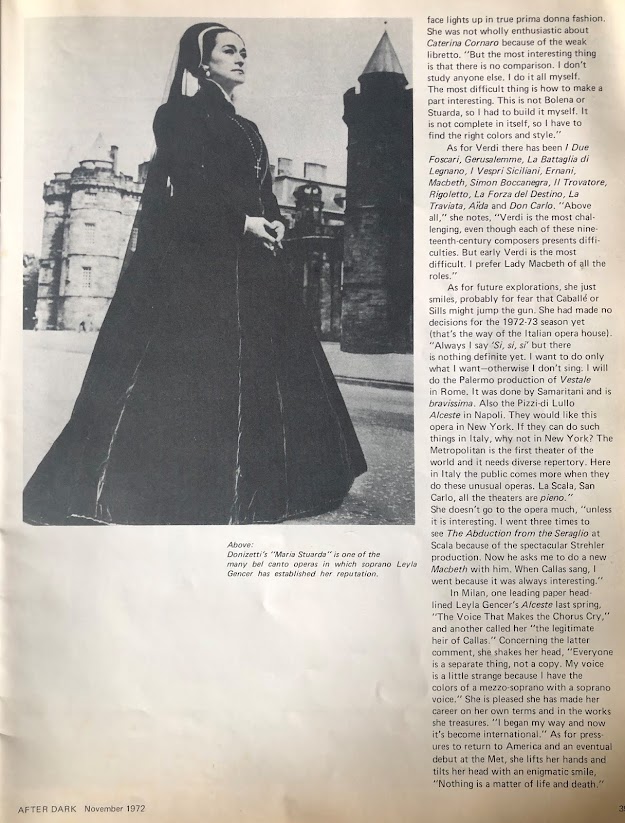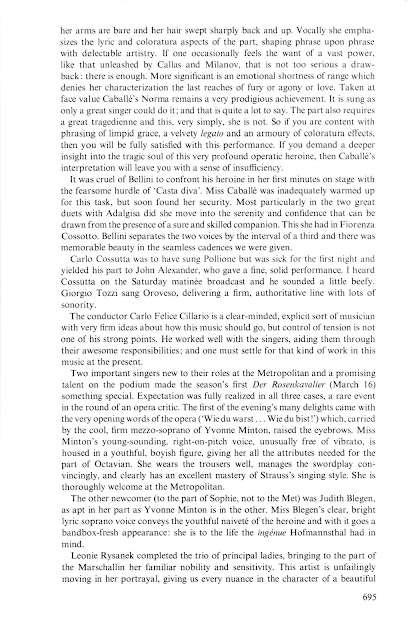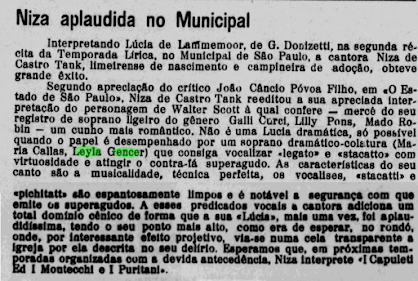Glyndebourne. Anna Bolena, Donizetti. With Leyla Gencer, Patricia Johnson, Maureen Morella, Juan Oncina, Carlo Cava, Don Garrard. c. Gianandrea Gavazzeni, p. Franco Enriquez, d. Lorenzo Ghiglia
Naples. Teatro San Carlo. Season opens December 11 and continues until the end of May. Dates given below are first nights and are subject to alteration. Works marked are receiving first local performances.
Naples. Teatro San Carlo. Lucrezia Borgia. With Gencer, Rota, Giacomo Aragall, Mario Petri, c. Carlo Franci, p. Margherita Wallmann (January 29)
Naples. Teatro San Carlo. Roberto Devereux (Donizetti) With Leyla Gencer, Giulietta Simionato, Ruggero Bondino, Piero Cappuccilli, Franco Bonanome. c. Mario Rossi, p. Margherita Wallmann, d. Attilio Colonello (February 22, 24, 27, March 1)
Naples. 19, Teatro San Carlo. Revival of Lucrezia Borgia, with Leyla Gencer.
Lausanne. The annual autumn festival of Italian opera at the Theatre de Beaulieu will open on October 6 with Norma with Leyla Gencer, Fiorenza Cossotto, Gastone Limarilli, Ivo Vince, c. Oliviero De Fabritiis, p. Enrico Frigerio (repeat performance on October 8).
Napoli. Adriana Lecouvreur. With Leyla Gencer, Adriana Lazzarini, Amedeo Zambon, Enzo Sordello, Plinio Clabassi, c. Oliviero De Fabritiis, p. Attilio Colonnello, d. Camillo Parravacini (December 17)
Napoli. Saffo (Pacini). With Leyla Gencer, Franca Mattiucci, Del Bianco, Louis Quilico, c. Capuana, p. Margherita Wallmann, d. Attilio Collonello
Firenze. Alceste. With Leyla Gencer, Mirto Picchi, Attilio D'Orazi, c. Vittorio Gui, p. Giorgio Di Lullo, d. Pier Luigi Pizzi (March 7)
Napoli. Lucrezia Borgia. With Gencer, Anna Maria Rota, Renato Cioni, Ruggero Raimondi, c. Francesco Molinari-Pradelli, p. Carlo Piccinato, d. Orlando Di Collalto (June 3)
OPERA MAGAZINE 1967 February
Turin, Teatro Regio will continue with the following: Norma. With Leyla Gencer, Fiorenza Cossotto, Bruno Prevedi, Ivo Vince, c. Oliviero De Fabritiis, p. Margherita Wallmann
DIARIO DE PAMAMBUCO 1967.03.05
OPERA MAGAZINE 1967 May
Florence. May 2 Teatro Comunale. May Festival opens with Donizetti's Maria Stuarda, with Leyla Gencer in the title-role.
OPERA MAGAZINE 1967 June
Verona Arena, July 16 to August 15 La Forza del Destino. With Leyla Gencer, Adriana Lazzarini, Gianfranco Cecchele, Piero Cappuccilli, Ivo Vince, Renato Capecchi, c. Franco Capuana, p. Herbert Graf, d. Attilio Colonnello. July 15, 20, 23, 30, August 3, 6, 10
OPERA MAGAZINE 1967 September
San Francisco, War Memorial Opera House. Season opens with La Gioconda with Leyla Gencer and Grace Bumbry
LA STAMPA 1967.09.23
TIME MAGAZINE 1967.09.29
Florence. May 2 Teatro Comunale. May Festival opens with Donizetti's Maria Stuarda, with Leyla Gencer in the title-role.
Verona Arena, July 16 to August 15 La Forza del Destino. With Leyla Gencer, Adriana Lazzarini, Gianfranco Cecchele, Piero Cappuccilli, Ivo Vince, Renato Capecchi, c. Franco Capuana, p. Herbert Graf, d. Attilio Colonnello. July 15, 20, 23, 30, August 3, 6, 10
San Francisco, War Memorial Opera House. Season opens with La Gioconda with Leyla Gencer and Grace Bumbry
OPERA MAGAZINE 1967 December
Milan. Teatro alla Scala The details of the 1967-8 season were announced by Gianandrea Gavazzeni, the theatre's artistic director, and are as follows: Idomeneo. With Leyla Gencer, Margherita Rinaldi, Peter Schreier, Domenico Trimarchi, Nicola Zaccaria, c. Wolfgang Sawallisch, p. Oscar Fritz Schuh.
Roma. The 1967-8 season at the Teatro dell’Opera, Don Carlo. With Leyla Gencer, Fiorenza Cossotto, Bruno Prevedi, Bruscantini, Nicolai Giaurov, Luigi Roni, c. Fernando Previtali, p. & d. Luchino Visconti. April 22, 24, 28, 30, May 2
Milan. Teatro alla Scala The details of the 1967-8 season were announced by Gianandrea Gavazzeni, the theatre's artistic director, and are as follows: Idomeneo. With Leyla Gencer, Margherita Rinaldi, Peter Schreier, Domenico Trimarchi, Nicola Zaccaria, c. Wolfgang Sawallisch, p. Oscar Fritz Schuh.
Roma. The 1967-8 season at the Teatro dell’Opera, Don Carlo. With Leyla Gencer, Fiorenza Cossotto, Bruno Prevedi, Bruscantini, Nicolai Giaurov, Luigi Roni, c. Fernando Previtali, p. & d. Luchino Visconti. April 22, 24, 28, 30, May 2
1 9 6 8

Verona Arena: July 20, 25, 28, August 1, 4, 7, 10, 13, 16 II Trovatore. With Leyla Gencer, Adriana Lazzarini, Carlo Bergonzi, Piero Cappuccilli, Paolo Washington, c. Franco Capuana.
Verona, Arena. 1968 season opens with Aida with Leyla Gencer in the title-
Bilbao. The Seventh Festival of Opera will take place at the Coliseo Albia from September 3 to 13 and will consist of performances of: Ernani. With Leyla Gencer, Gianfranco Cecchele, Piero Cappuccilli, Ruggero Raimondi, c. Manno Wolf-Ferrari.
Miami. The Opera Guild of Greater Miami. La Forza del Destino with Leyla Gencer, Jane Berbie, Bruno Prevedi, Manuel Ausensi, Ruggero Raimondi, Andrew Foldi, and Voketaitis on March 17, 19, 22. Emerson Buckley will conduct all three operas and the producer will be Anthony Stivanello.
DINO CIANI CD / LP ALBUMS Album
de chaumiere ROSSINI
Roma. Macbeth. With Leyla Gencer, Giorgio Casellato Lamberti, Iacopucci, Mario Zanasi, Lotenzo Gaetani, Colella, c. Bruno Barcoletti, p. Giorgio De Lullo, d. Pier Luigi Pizzi. April 2, 5, 8, 10, 13, 16
Florence. The season at the Teatro Comunale is as follows: Macbeth. With Leyla Gencer, Angelo Mori, Cornell MacNeil, Luigi Roni, c. Bartoletti, p. Aldo Mirabella Vassallo, d. Mischia Scandella. January 12, 15, 19

1 9 6 9
Turin. The season at the Teatro Nuovo will last from January 2 to May 13. The operas and casts are as follows: Alceste. With Leyla Gencer, Mirto Picchi, Attilio D'Orazi, c. Franco Capuana, p. Alessandro Brissoni. March 4, 6, 9
Venezia. The 1968-9 season at the Teatro La Fenice Belisario (Donizetti). With Leyla Gencer, Umberto Grilli, Taddei, Nicola Zaccaria, c. Gianandrea Gavazzeni, p. Alberto Fassmi. May 6, 9, 11, 14, 17
Venice. Teatro La Fenice. Revival of Donizetti's Belisario with Leyla Gencer and Giuseppe Taddei
Genoa. The season at the Teatro Margherita, which opened on March 11 with Ernani, followed by May 25, June 1 Medea (Cherubini). With Leyla Gencer, Rita Talarico, Aldo Bottion, Paolo Washington, c. Peloso, p. Alberto Fassini, d. Pier-Luigi Pizzi. June 4, 8, 10
Florence. Florance Opera opens its season with Donizetti's Maria Stuarda with Leyla Gencer
Naples. Teatro San Carlo. Aida with Leyla Gencer, Biserka Cvejic, Flaviano Labe, Giampiero Mastromei, c. Alberto Erode, p. Hans Busch;
Napoli. 1970-71 season at the Teatro San Carlo are as follows: February 13 Cavalleria Rusticana. With Leyla Gencer, Amedeo Zambon, Giulio Fioravanti and Gianni Schicchi. With Elvidia Ferracuti, Carlo Frantini, Rolando Panerai, c. and p. to be announced.
Rome. 1970-71 season at the Teatro dell’Opera, are as follows: February 22 La Gioconda. With Leyla Gencer, Mattiucci, Gianni Raimondi, Giangiacomo Guelfi, Ruggero Raimondi, c. Nino Sanzogno, p. Gianrico Becher, d. Veniero Colosanti and John Moore.

Milan. Full casts for the current season at La Scala have now been announced, and are as follows: Les Vepres Siciliennes. With Renata Scotto/Leyla Gencer, Gianni Raimondi/ Giorgio Casellato Lamberti, Piero Cappuccilli/Lorenzo Saccomani/Licinio Montefusco, Ruggero Raimondi/Carlo Cava/Paolo Washington, c. Gianandrea Gavazzeni, p. Giorgio Di Lullo, d. Pier Luigi Pizzi




We are in the dressing room of Leyla Gencer, the celebrated soprano who has brought to life tonight, after more than a century, the forgotten Rossinian character, Queen Elizabeth of England. Rossini wrote Elizabeth to suit the exceptional gifts of the beautiful Isabella Colbran, who was later to become his wife. The writer, Stendhal, said of her interpretation: 'Everything was reflected in her Spanish eyes, so beautiful, yet at certain moments so fierce." After 137 years, we are again in the presence of another dark Mediterranean beauty, born on the shores of the Bosphorus, the Turkish soprano, Leyla Gencer, interpreter of the role of Elizabeth. We might say that Rossini wrote it also for you, Madame. Musically and visually, the character suits you well—that of Elizabeth.






The throne suits Gencer well
It’s rumoured that Leyla
Gencer has about two hundred activist fans who often come to see her
performances and organize “punishment acts” against her rivals from time to
time. A year ago, before I met Signora Gencer, it was rumoured that these fans
had declared a war against the Greek soprano Eleanor Suliotis during the
Macbeth performances in Genoa. Whether they were true or false, that rumour
awoke my imagination. We all know the concept of ten to twenty fanatics’
hostile acts. They seem ordinary and vulgar when they’re together. But a troop
of two hundred guardsmen means a well-equipped organization. And what’s more to
say about a woman who caused a war between Greeks and Turks and even made
Italians fight under the Turkish flag?
Edinburgh. King's Theatre. Leyla Gencer sings title-role in Rossini's Elisabetta, Regina d'Inghilterra.
Milan. April 2 Un Ballo in Maschera. With Leyla Gencer, Lazzarini / Anghelakova, Santelli / Elvina Ramella, Giorgio Merighi, Cappuccilli/ Fioravanti, c. Nino Verchi.
Naples. The 1972-3 season at the Teatro San Carlo December 26/29, January 3/7. Belisario. With Leyla Gencer, Bianca Maria Casoni, Ottavio Garaventa, Giuseppe Taddei, Silvano Pagliuca, c. Carlo Franci, p. Alberto Fassini, d. Pier Luigi Pizzi.
Rome. The 1972-3 season at the Teatro dell’Opera opened on November 23 with I Masnadieri followed by Lucia di Lammermoor on November 27. The repertory and casts for the rest of the season are as follows: April 14 La Vestale. With Leyla Gencer, Bianca Maria Casoni, Umberto Grilli, Carlo Cava, Mario Petri, c. Carlo Franci, p. Mauro Bolognini, d. Pier-Luigi Samaritani.

1 9 7 4
Los Angeles. We hear that... Leyla Gencer will sing the title-role in Lucrezia Borgia in Los Angeles next month.





































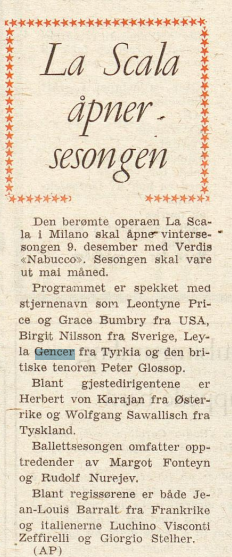





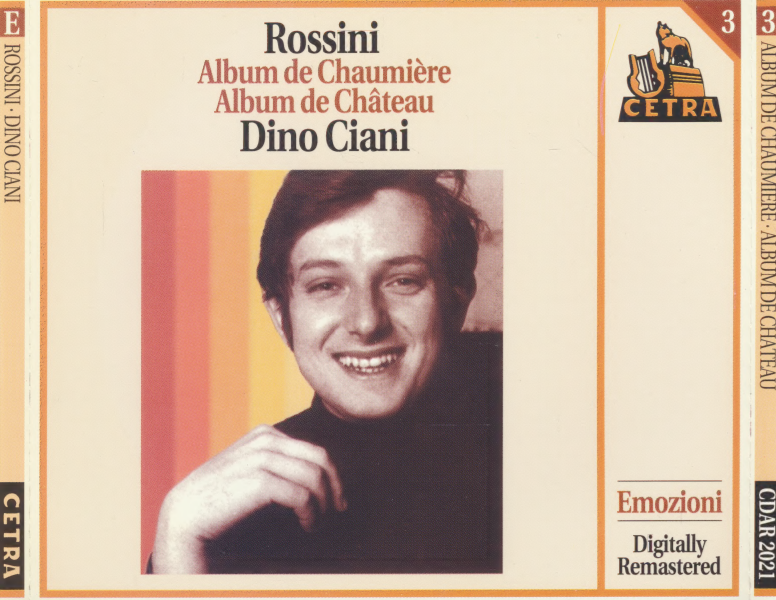










































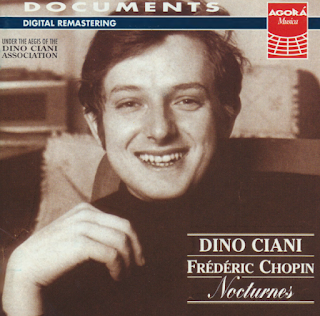









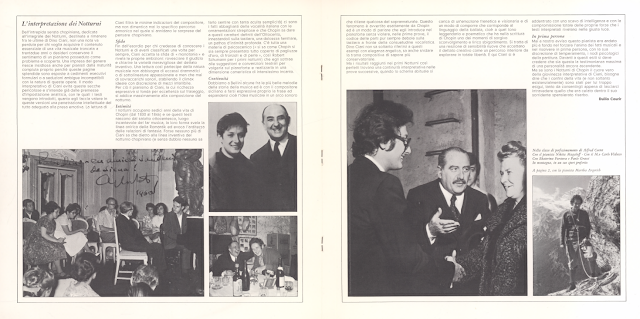

%20Genel%20(0).png)
%20Genel%20(1).png)

%20Genel%20(3).png)
%20Genel%20(3a).png)
%20Genel%20(4).png)
%20Genel%20(5).png)
%20Genel%20(5a).png)







































